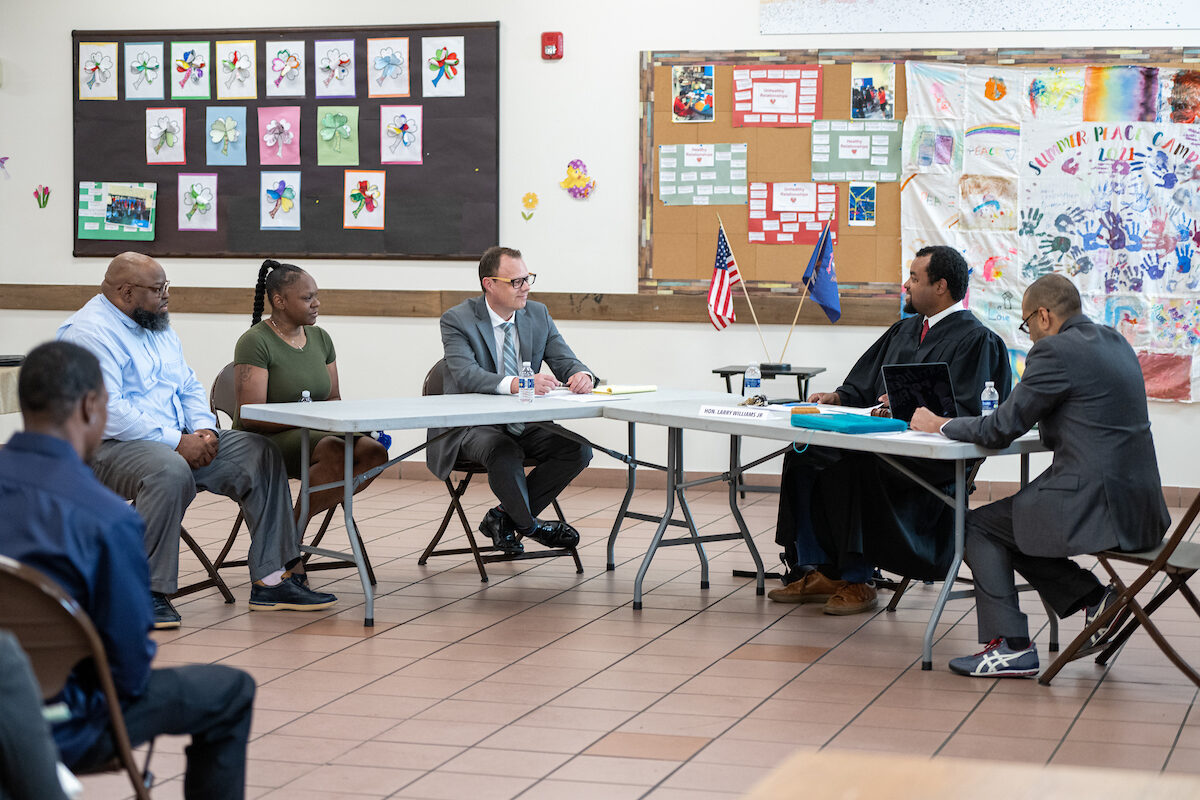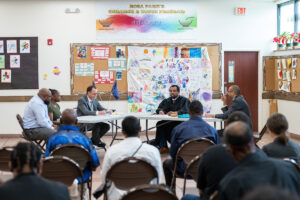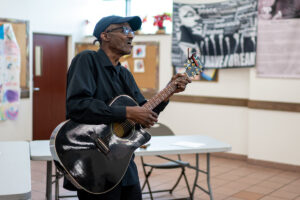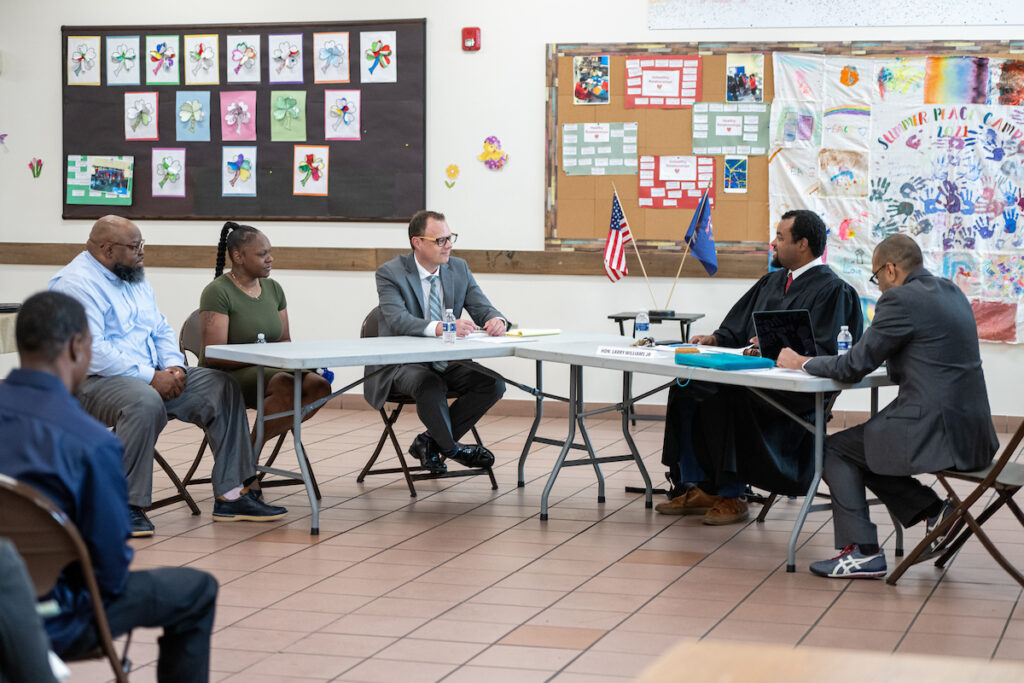Source: Special to Michigan News

5/23/23. Detroit Street Court Danahjia Davis and daughter Damyna Davis

Danahjia Davis and daughter Damyna Davis attend Street Court.
Gregory Thompson strummed his guitar and filled the Capuchin Soup Kitchen in east Detroit with his rendition of Bob Marley’s “No Woman, No Cry.” On the warm Tuesday afternoon in late May, people snacked on chips as they took in the music from folding chairs arranged in rows.
Jayesh Patel, managing attorney at Street Democracy, checked in the 11 defendants preparing for their hearings. Charles Hobbs, a senior staff attorney at Street Democracy, settled behind a table at the front of the room, opposite the seat designated for Judge Larry Williams Jr.
Court would begin soon.
 Since 2012, Street Democracy and Detroit Action Commonwealth have coordinated Street Outreach Court Detroit. Run through Detroit’s 36th District Court, the program allows people to have traffic tickets dismissed, recover suspended driver’s licenses, and have court fees waived or reduced. People experiencing homelessness or at high risk of homelessness are eligible for the program, and they spend 90 days working on an action plan to address the root cause of their homelessness before appearing before the judge to request relief.
Since 2012, Street Democracy and Detroit Action Commonwealth have coordinated Street Outreach Court Detroit. Run through Detroit’s 36th District Court, the program allows people to have traffic tickets dismissed, recover suspended driver’s licenses, and have court fees waived or reduced. People experiencing homelessness or at high risk of homelessness are eligible for the program, and they spend 90 days working on an action plan to address the root cause of their homelessness before appearing before the judge to request relief.
“It’s not just about getting their license back. It’s about getting back their dignity and their lives,” said Clark Washington, an organizer with Detroit Action Commonwealth, which was co-founded by Gregory Markus, University of Michigan professor emeritus of political science.
A total of 785 people have graduated from Street Outreach Court Detroit, which paused in 2015 to obtain more formal approvals and restarted in 2018. For the 93 graduates of 2022, street court resolved 1,083 matters and eliminated about $139,000 in fines.
“You know, $200 is easy for a lot of folks. But if you can’t afford that, it becomes everything,” said Judge Williams, a 2000 graduate of U-M. “And that’s when you start to see this snowball of tickets, and when you get your license suspended, it’s hard to get out of that.”

Judge Williams
Street court exemplifies Street Democracy’s approach to functional sentencing, which envisions a legal system that coaches people to success rather than punishing them. In 2019, Street Democracy worked with U-M Dearborn faculty to explore ways to expand a functional sentencing model piloted in Hamtramck courts.
“You want to give somebody the opportunity to address the root causes of their situation, and that’s the best solution for recidivism and for this person. So it’s a win-win from a justice perspective and from a personal development perspective,” Patel said. “We were trying to figure out what’s the level of (intervention) that’s required to actually be effective with this population.”
Thompson, the singer-songwriter who performed before the court proceedings, was one of the defendants appearing in court that day. Hobbs reviewed Thompson’s action plan with Williams and called for testimony from the service provider who had worked with Thompson. Thompson wanted to grow the music classes he teaches for youth.
“You are such an important part of the community,” Williams said and commended him on promoting music education. Williams granted relief from Thompson’s traffic violations, and the ruling was met with a round of applause.

Gregory Thompson sings while everyone waits for the judge.
Over the series of 5-minute hearings, defendants shared their progress in starting a trucking business, taking classes to become a phlebotomist, earning a real estate license, or maintaining sobriety. Williams offered encouragement and congratulations on their efforts. Positive interactions with the judge and holding the monthly hearings at a soup kitchen instead of a courtroom makes the experience less intimidating, Hobbs said.
“We hold it here because it’s a safe place,” he said. “It helps people acclimate to the court environment, so if they have these things in the future, they’re not so afraid to go into the court.”
Street court was part of Nikeya McCullough’s fresh start. She worked with Project Clean Slate to get a felony charge dropped and expunge a misdemeanor from her record, and that program referred her to Street Democracy to address her traffic violations. McCullough never had a valid driver’s license, but Street Court changed that. The mother of two said she was looking forward to driving without worry, increasing her work hours at Ford from part-time to full-time, and completing a credit repair program with the goal of eventually purchasing a house.
“I’ll be able to go where I need to go and do what I need to do comfortably,” she said. “I feel relieved. They helped with a lot of things I didn’t know about and answered a lot of my questions. It gave me resources.”


